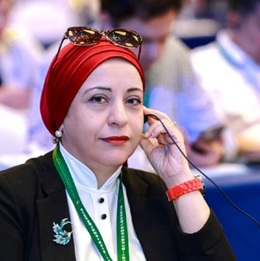Bridging the Chasm: How the Middle East Can Navigate Conflict and Join the Global Economic Elite

Dr. Aydah Almasri
جو 24 :
In a world marked by economic disparities and geopolitical tensions, the journey from poverty to prosperity is more than just a financial endeavor—it is a fight for survival. The Middle East, a region fraught with historical conflicts and complex social dynamics, stands at a critical crossroads. Like China and India, the nations of this region aspire to join the ranks of the world's wealthiest countries. But their path is fraught with challenges that demand not just economic strategies but a profound understanding of conflict management.
As highlighted by the World Bank in a recent discussion on economic growth, the aspiration to "get rich” is not just a matter of national pride—it is a vital necessity. Economic growth brings the promise of higher living standards, reduced poverty, and a more sustainable future. However, for nations in the Middle East, the journey toward prosperity is hindered by more than just economic barriers. Deep-rooted conflicts, political instability, and a legacy of colonialism have left the region in a state of perpetual struggle (Gill, 2024)*.
As a Jordanian, I have seen firsthand the struggles of our region—struggles that are deeply intertwined with our economic aspirations. My homeland, rich in history and culture, has the potential to thrive, yet it faces the same challenges that have stymied progress in much of the Middle East. We can learn a lot from the strategies employed by countries like China, which, despite its own challenges, has managed to lift millions out of poverty and position itself as a global economic powerhouse.
China's approach to economic growth has been nothing short of revolutionary. The country embarked on its journey by first attracting massive amounts of investment, particularly in its manufacturing sector. This investment was the engine that powered China’s initial economic boom. However, unlike many Middle Eastern countries that remain stuck in this phase, China recognized the limitations of relying solely on investment. It understood that to climb the income ladder, it needed to infuse its economy with advanced technologies and business practices.
China’s next step was to encourage the acquisition of foreign technologies and adapt them to its own needs. This approach allowed Chinese companies to evolve from low-cost manufacturers to global leaders in technology and innovation. The government played a crucial role in this transformation, setting policies that fostered the development of a skilled workforce. Today, China stands as a leader in fields ranging from artificial intelligence to renewable energy, a testament to its successful implementation of the "3i” strategy—investment, infusion, and innovation (Gill, 2024)*.
In contrast, many Middle Eastern countries, including Jordan, have struggled to move beyond the initial phase of investment attraction. We have yet to fully harness the power of technology infusion or cultivate a culture of innovation. Our economies remain heavily reliant on traditional industries and are often hampered by political instability and social unrest. The success of China’s model lies in its ability to adapt and evolve, something that our region must learn to do if we hope to achieve similar success.
However, the challenges faced by the Middle East are not merely economic. The region is in the grip of intense and ongoing conflict, particularly the Israeli occupation of Palestine. The brutal reality of this occupation, with its expansionist ambitions, continues to stifle the potential for economic growth and stability across the region. The current situation in Gaza, where relentless airstrikes and blockades have resulted in unimaginable suffering, serves as a tragic reminder of how deeply conflict is intertwined with economic stagnation.
The Israeli-Palestinian conflict has roots that run deep, and its impacts extend far beyond the immediate violence. The constant state of insecurity has created an environment where investment is risky, innovation is stifled, and the focus is often on survival rather than growth. The world watches as Gaza burns, but the flames of war are not confined to that small strip of land; They ignite tensions and instability throughout the Middle East, affecting countries like Jordan that are trying to build a future amid the chaos.
For Jordan and the broader Middle East, the lesson is clear: we must not only attract investment but also actively seek out and integrate advanced technologies. Yet, without resolving the conflicts that plague our region, these efforts may be in vain. The international community must recognize that the economic future of the Middle East is inextricably linked to its political stability. Peace is not just a moral imperative—it is an economic necessity.
To achieve this, it is imperative that we elevate the capacities related to conflict management for all stakeholders and actors. Governments, civil society, businesses, and international organizations must all be equipped with the tools and knowledge necessary to navigate and resolve conflicts. Effective conflict management is not an optional skill; It is a critical component of sustainable development and economic growth.
Our leaders must invest in training and education that focuses on conflict resolution, negotiation, and peacebuilding. These skills are not just for diplomats; They are essential for business leaders who must operate in volatile environments, for community leaders who mediate local disputes, and for young people who will inherit the challenges of our region. By empowering all sectors of society with these capabilities, we can create a resilient foundation for economic growth that is less vulnerable to the disruptions of conflict.
Moreover, we must seize the opportunities presented by the global shift toward green energy. Jordan, with its abundant sunlight, is ideally positioned to become a leader in solar energy production. By investing in renewable energy, we can not only reduce our dependence on fossil fuels but also create new industries that will drive economic growth. However, this potential can only be realized in a stable and peaceful environment.
The road ahead is challenging, but the potential rewards are transformative. By embracing a holistic approach that combines robust conflict management with forward-thinking economic strategies, the Middle East can chart a path to a future where prosperity is within reach for all its people. As a Jordanian, I hold onto the hope that our region can rise above its current struggles and take its rightful place among the world’s most prosperous nations. But this will only happen if we are willing to confront our challenges head-on, learn from others’ successes, and adapt those lessons to our unique circumstances. The time for action is now, and the world is watching. Let us not miss this moment to reshape our destiny.
* Gill, Indermit. "What China and India must do to join the rich club." World Bank Blogs, August 12, 2024. https://blogs.worldbank.org/en/voices/what-china-and-india-must-do-to-join-the-rich-club.









